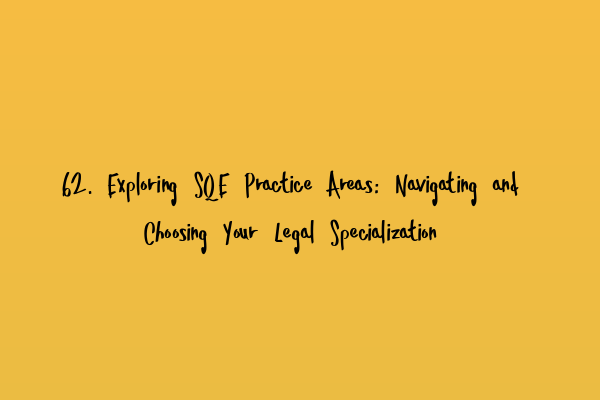62. Exploring SQE Practice Areas: Navigating and Choosing Your Legal Specialization
Deciding on a legal specialization is an important step in your legal career. Whether you are preparing for the Solicitors Qualifying Examination (SQE) or are a newly qualified solicitor, understanding the different practice areas available to you is crucial for success. In this article, we will explore various SQE practice areas and provide guidance on how to navigate and choose your legal specialization.
Why Choose a Specialization?
Choosing a legal specialization offers several advantages. By focusing on a specific area of law, you can develop in-depth knowledge and expertise, which can make you a valuable asset to clients and employers. Specializing also allows you to carve out a niche for yourself, differentiate from other legal professionals, and potentially command higher fees.
Types of Practice Areas
The SQE offers a wide range of practice areas to choose from. Traditionally, these include:
- Corporate and Commercial Law: Specializing in corporate and commercial law involves advising clients on mergers and acquisitions, contract negotiation, corporate governance, and regulatory compliance. It also encompasses areas such as banking and finance, intellectual property, and competition law.
- Criminal Law: Criminal law practitioners represent clients in criminal proceedings, including investigations, arrests, plea bargains, trials, and appeals. This area of law covers a range of offenses, from minor infractions to serious crimes.
- Family Law: Family law specialists handle legal matters related to family relationships, such as divorce, child custody, adoption, and domestic violence. They provide guidance and support during emotionally challenging times and aim to achieve fair resolutions for all parties involved.
- Employment Law: Employment law focuses on the legal rights and obligations of employers and employees. Specializing in this area involves advising clients on matters such as employment contracts, discrimination, harassment, wrongful termination, and workplace policies.
- Property Law: Property law deals with legal aspects of real estate transactions, including buying, selling, leasing, and developing properties. It also encompasses landlord-tenant disputes, property management, and property finance.
- Public Law: Public law specialists work in areas such as administrative law, constitutional law, and human rights law. They often represent clients in disputes against governmental bodies and ensure compliance with legal standards and procedures.
These are just a few examples of the diverse practice areas available within the SQE framework. It’s essential to conduct thorough research and explore various options before making a decision.
Navigating and Choosing Your Specialization
When navigating and choosing your legal specialization, consider the following:
- Interests and Passions: Identify the areas of law that genuinely interest and inspire you. Think about the types of cases and clients you are likely to encounter in each practice area and envision yourself working in those contexts.
- Skills and Talents: Assess your skills and talents to determine which practice areas align with your strengths. For example, if you enjoy public speaking and have strong negotiation skills, litigation-focused areas such as criminal law or dispute resolution might be a good fit.
- Market Demand: Research the current and future market demand for different practice areas. Some areas may be more saturated with practitioners, while others may offer more significant growth opportunities. Consider the local and global market trends and make an informed decision.
- Networking and Mentorship: Engage in networking events, conferences, and seminars to connect with experienced professionals in your desired practice areas. Seek mentorship opportunities to gain valuable insights and advice from those who have achieved success in the field.
- Pursue Further Education: If you are still unsure about which practice area to specialize in, consider pursuing further education, such as postgraduate courses or certifications. These can provide you with more in-depth knowledge and exposure to specific areas of law, helping you make an informed decision.
Remember, your choice of specialization is not set in stone. As your legal career progresses, you may choose to switch practice areas or even develop expertise in multiple areas. It’s crucial to remain flexible and adaptable as the legal landscape evolves.
For more insights on navigating the SQE and succeeding in your legal career, check out these related articles:
- 24. Unlocking Knowledge with SQE Webinars: Expert Insights at Your Fingertips
- 31. Conquer the SQE: Insider Tips and Study Tricks for Success
- Grading System in SQE: Understanding How Exams are Evaluated
- Time Management for SQE: Strategies for Efficient Study Planning
- Role Play Assessments in SQE: Tips for Nailing the Practical Skills
We hope this article has provided valuable insights into the exploration and selection of SQE practice areas. Remember, choosing the right specialization is an essential step towards shaping a successful and fulfilling legal career.
